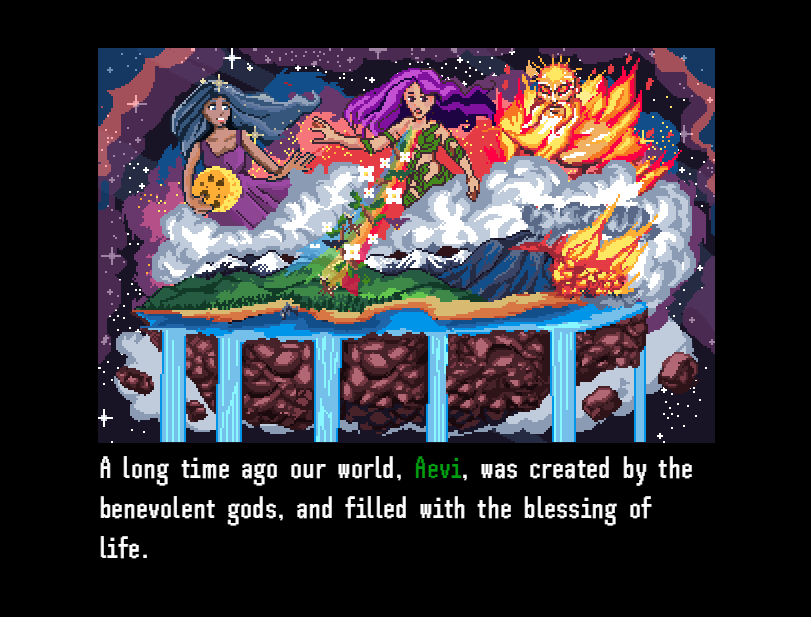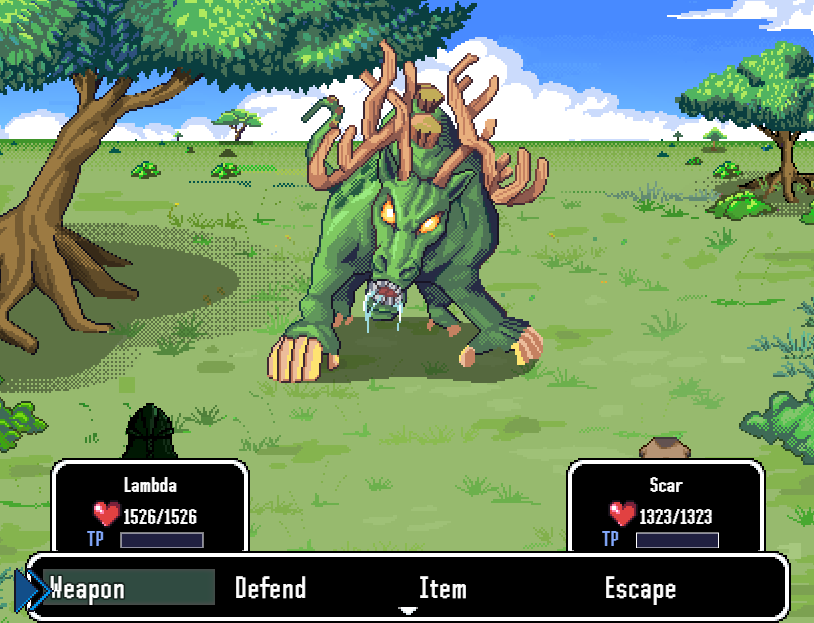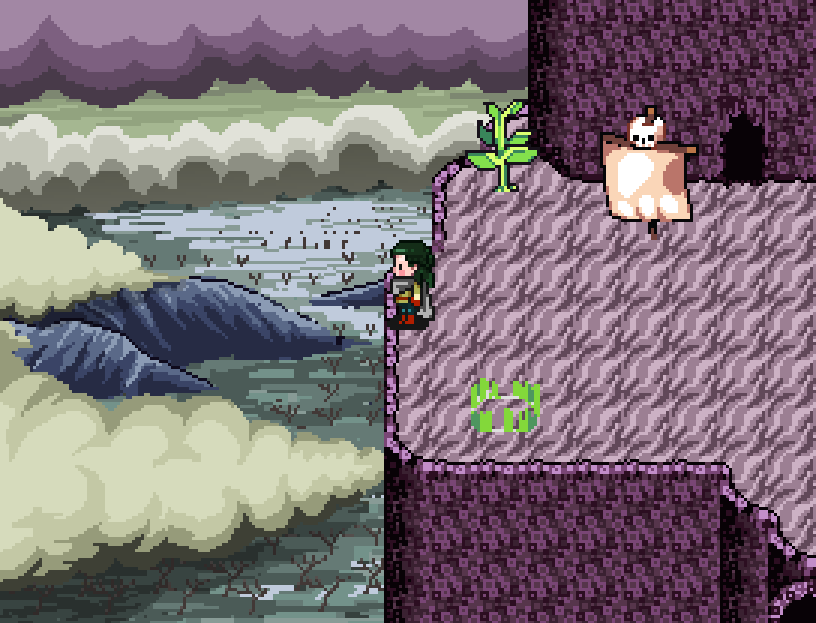I’ll get the most important detail of Wolfsden’s debut RPG Manafinder out of the way right now. The heroine can pet the Bullmastiff-looking dog that becomes her permanent companion. Beyond petting the dog, Manafinder offers a solid Japanese-style RPG experience with fun gameplay, a solid storyline, melodious music, and colorful visuals. Allow me to detail why this cool indie game is worth your time.
For reasons unknown, Manafinder’s protagonist Lambda is one of several people cruelly exiled from the kingdom of Manahill. While searching for food and shelter outside Manahill’s protective barrier, vicious beasts kill most of the exiles. Lambda herself barely survives a run-in with a deadly cave dragon. Luckily, a resident of The Settlement — a growing outpost of exiled survivors — finds her battered body. Lambda, one of the few with combat prowess, is conscripted by the Manafinders. This select group ventures beyond The Settlement’s protective barrier seeking manastones to fuel the magic-technology needed for civilized life.
Lambda’s first mission to locate a missing Manafinder named Soren is eventful. She communes with the world’s gods, encounters Soren’s dog Scar, helps Scar avenge Soren’s death at the hands of a waterfall monster, and meets a sinister stranger with ties to The Settlement. From this point on, the exiled lady and lost dog join forces to make sense of their new lives. The tale is mostly linear, but morally ambiguous decisions made throughout the game influence which final chapter and subsequent ending you will see. There is also a New Game+ feature. The main storyline is great, but the best part is getting to know the people in The Settlement via side content.

As much as I enjoyed Manafinder’s story, it is not flawless. Firstly, stray technical errors and occasionally stiff writing made several conversations read awkwardly. Secondly, a few of the more emotionally charged plot beats were abruptly presented and could have used more time to marinate. My biggest issue, though, was that it does not delve into Lambda’s backstory. What was her former life in Manahill like? What circumstances led to her exile? I wanted to know more about the protagonist I was following.
Manafinder plays similarly to classic JRPGs, albeit with some twists. Lambda carries multiple weapons, so choosing the right weapon for each enemy encounter is essential. Equally important is gathering. While some useful items are purchasable, you can generally only acquire healing herbs, mana shards (for casting spells), and ores (to temporarily imbue elemental properties to equipment) by gathering in the field. The limited carrying capacity of some items encourages strategic resource management.
Another twist is in how the game handles character growth. As you fight enemies, you gain Spirit Dust. When you set up camp in the field or visit The Settlement’s temple, the goddess Behra collects your Spirit Dust. When you’ve given Behra enough to level up, she gives you a blessing that you can offer to one of two other deities in exchange for a boon. A blessing to Vaethia allows Lambda to either boost a defensive stat, gain a resistance, or learn a support spell. A blessing to Allaror grants an offensive stat boost, faster buildups of your TP bar (which opens up special attacks when filled), or more aggressive magic to learn. How you choose to build Lambda is up to you.

Manafinder features traditional turn-based battles. Enemies are visible on the field, though some ambushing predators disguise themselves as rocks, bushes, or other environmental setpieces. This is not a game where you can bulldoze through battles; thoughtful strategy and a little luck win the day. Lambda and Scar are the primary combatants, though some guests join the duo. As for Scar, he is not fully controllable. It’s hard to explain, but how battling works makes Scar viscerally feel like a canine companion. He’s obedient yet still has a mind of his own, and Lambda needs to look out for him like a responsible pet parent. There are times and places within The Settlement where Lambda can pet Scar, and that animation is adorable. Petting Scar doesn’t seem to offer any stat bonuses and is done just for fun.
Outside of the main quest, side content comprises a significant portion of Manafinder’s gameplay. Yes, there are traditional sidequests like hunting rare creatures for rewards, but most of the side content is fun minigames. I enjoyed taking trivia quizzes, playing arcade-style games (e.g., tending bar à la Diner Dash), playing games like tag with some neighborhood kids, and more. As a bonus, the minigames and side content connected me to several of The Settlement’s denizens, and they started to feel like friends rather than just NPCs.

It’s easy to name games that have “better” graphics, including other RPG Maker MV games, but there’s no denying that Manafinder has style! The developers put a lot of care into bringing Manafinder’s vibrant, pixel-art world to life. Vividly colored environments, creatively designed enemy sprites, and beautifully drawn cutscenes are a joy to behold. Lambda’s battle sprite design and animations remind me of the beloved classic Phantasy Star IV: The End of the Millennium. It’s common to see retro-styled JRPGs influenced by SNES classics, but rare to see ones taking cues from Genesis games.
The music, too, reminds me more of tunes produced by the Genesis’ sound chip rather than the Super NES’. I don’t know if it’s the instrumentation, the melodies, or something else, but Manafinder’s music immediately made me think “Genesis” rather than “Super NES.” The standard boss theme, for example, gave me serious Phantasy Star IV vibes. Speaking of boss themes, Manafinder has multiple, but the normal boss theme was by far my favorite piece of music in the entire game. Between battles, evocative location themes enhance settings and make the world inviting to explore. My favorite location theme was that of a volcanic dungeon called Illia’s Cauldron. That piece of music evoked the discomfort of penetrating heat from both the location and the plot beats tied to it. Composer Nestor Ovilla has created a fantastic soundtrack, and I look forward to hearing more from him in the future.
Manafinder is a great game that reminds me of old favorites while rocking a style all its own. Except for the heroine’s lack of backstory, the game does little wrong. And, again, you can pet the dog. Come to think of it, we more commonly see wolf-like or Doberman-style dogs in video games, so Scar being akin to a Bullmastiff is quite refreshing. Representation matters, including canine representation. In the sea of retro-RPGs inspired by Japanese classics, Manafinder’s distinct charm stood out to me, and I encourage RPG fans to check it out.


